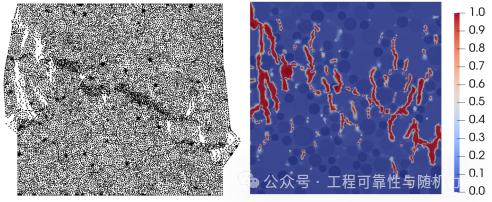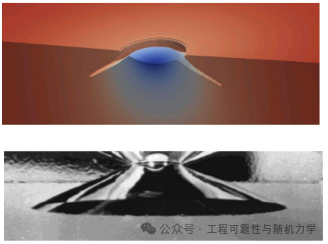工程可靠性与随机力学国际联合研究中心
2025年第11期(总第103期)学术报告
工程力学研究中心第57期学术报告
文远讲坛325期
报告主题
TOPIC
相场断裂模型在准脆性材料压缩问题中的研究进展
Advancements on phase-field models for fracture applied to quasi-brittle materials in compression
报告人
SPEAKER
Prof. Marco Paggi
Full Professor, Deputy Rector, IMT School for Advanced Studies Lucca, Italy
报告时间
TIME
2025年9月26日(周五)下午15:30-16:30
报告地点
VENUE
同济大学土木大楼 A305
主持人
CHAIR
任晓丹教授、陈建兵教授
联系人:谢建康
报告摘要
Abstract
To improve the capability of the variational (phase-field) approach to simulate also damage in compression, which is precluded by the classical way damage is introduced in the tensorial split, a multi-phase field formulation has been proposed in [1] as the theoretical framework to cast the solution method and comply with the physics of the problem. Inspired by a previous successful application of multi-phase fields to simulate different damage mechanisms in composites [2], the proposed method considers two distinct damage evolution equations, one describing the nonlocal damage leading to fracture in tension, and another simulating diffusive damage in compression, which is called crushing. Evidence of damage in compression and the need of simulating it separately from fracture in tension has its long roots in nonlocal damage formulations [3] and, in the G-convergence limit, the phase field approach leads to a dissipation over potential lines/surfaces with the definition of a crushing energy consistent with previous studies [4] that explained how to quantify its value for concrete. This radically new formulation has been tested in [1] to meso-scale models of cylindrical and prismatic concrete specimens under compression, modelled as a brittle matrix with embedded aggregates. Results show that the model can capture the main features of compressive tests observed in experiments and quantify the effect of the lateral confinement and the amount of dissipated energy in compression (see Fig. 1a).
As a second problem, an efficient theoretical and numerical framework for simulating cracking phenomena due to nonconformal contacts with indenter profiles of arbitrary shapes is presented [5]. The formulation relies on a coupled approach involving the phase-field variational framework to model cracking in the substrate, and the MPJR (eMbedded Profile for Joint Roughness) interface finite elements [6] developed to solve the nonconformal contact problem between the indenter and the substrate. The framework has been applied to predict cone-crack formation in the case of indentation tests with smooth spherical indenters, validating the predictions with experimental data (see Fig. 1b). Moreover, an insight into modelling and simulation of the effect of microscopical roughness along the spherical indenter onto crack growth has been provided for the very first time.

(a)

(b)
Figure 1. (a) Simulation of fracture in compressed meso-scale models of concrete (deformed mesh and phase field variable associated to fracture); (b) simulation of conical cracks in spherical indentation tests and comparison with experiments taken from the literature.
References:
[1] Lenarda P., Reinoso J., Paggi M. Multi-phase field approach to tensile fracture and compressive crushing in grained heterogeneous materials. Theor. Appl. Fract. Mech., 122:103632, 2022.
[2] Asur Vijaya Kumar P.K., Dean A., Reinoso J., Paggi M. A multi phase-field-cohesive zone model for laminated composites: Application to delamination migration. Comp. Struct., 276:114471, 2021.
[3] Comi C., Perego U. Fracture energy based bi-dissipative damage model for concrete, Int. J. Sol. Struct., 38:6427-6454, 2001.
[4] Carpinteri A., Corrado M., Paggi M. An analytical model based on strain localization for the study of size-scale and slenderness effects in uniaxial compression tests. Strain, 47:351–362, 2011.
[5] Marulli M.R., Bonari J., Reinoso J., Paggi M. A coupled approach to predict cone-cracks in spherical indentation tests with smooth or rough indenters, J. Mech. Phys. Solids, 178:105345, 2023.
[6] Paggi M., Reinoso J. A variational approach with embedded roughness for adhesive contact problems, Mech. Adv. Mater. Struct., 27:1731–1747, 2020.
报告人简介
Speaker Bio
Prof. Marco Paggi is a Full Professor of Structural Mechanics at the IMT School for Advanced Studies Lucca, Italy. He serves as the Deputy Rector and directs both the Multi-scale Analysis of Materials (MUSAM) research unit and the MUSAM-Lab.
He received his PhD in Structural Mechanics from the Politecnico di Torino, Italy, in 2005. In 2010, he was awarded an Alexander von Humboldt Research Fellowship at Leibniz Universität Hannover, Germany. He has held visiting positions at several prestigious institutions, including Université Paris-Est (France), the University of Girona (Spain), and the Indian Institute of Technology Delhi (India). Prior to his current appointment, he was a professor at the Politecnico di Torino, the University of Pisa, and the University of Trento.
His research focuses on contact mechanics, fracture mechanics, and multiphysics simulations, with applications to a wide range of structural and material systems. Professor Paggi is the author of over 250 peer-reviewed publications and has been the Principal Investigator of numerous EU-funded projects, including two prestigious grants from the European Research Council (ERC).
同济大学 上海市杨浦区四平路1239号
邮编200092
电话:+ 86-21-65981505
